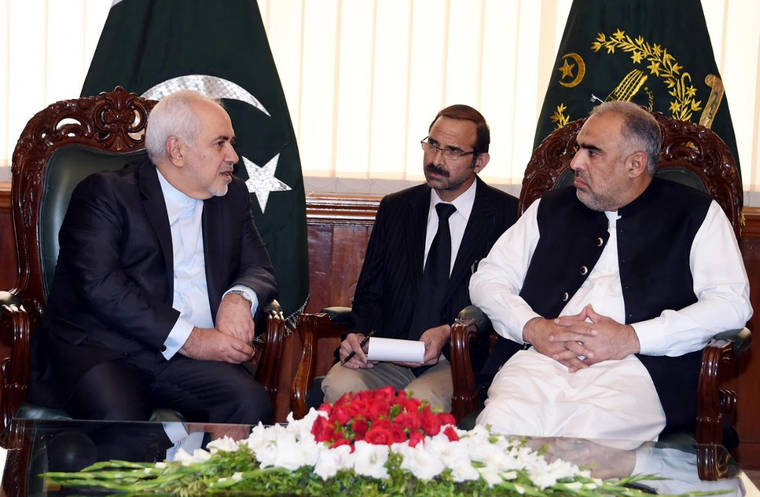BAGHDAD (AP) — Iraq’s parliament speaker said Saturday that Baghdad is ready to mediate between the United States and Iran if it is asked to do so.
Mohamad Halbousi’s comments, carried by state TV, came shortly after Iran’s Foreign Minister Mohammad Javad Zarif arrived in Baghdad beginning a two-day visit.
Tension between the U.S. and Iran have escalated ever since the Trump administration withdrew last year from the 2015 nuclear deal between the Islamic Republic and world powers and reinstated American sanctions that have badly damaged the Iranian economy.
President Donald Trump has argued that the nuclear deal failed to sufficiently curb Iran’s ability to develop nuclear weapons or halt its support for militias throughout the Middle East that the U.S. argues destabilize the region.
Iraqi TV aired footage of Zarif upon arrival while being received by the Foreign Ministry’s undersecretary Nizar Khairallah.
“We are ready to mediate to solve the crisis between Washington and Tehran if we are asked for that,” al-Halbousi, whose country has close ties with both Washington and Tehran, said. He added that there has been “no official request for such mediation.”
Later in the day, Prime Minister Adel Abdul-Mahdi hosted Zarif for iftar, the meal that breaks daylong fasting during the Muslim holy month of Ramadan.
A statement released by Abdul-Mahdi’s office said the two officials discussed “ways of making the two countries and the region avoid the harms of sanctions and the dangers of war.” They also spoke about the importance of security and stability in the Middle East and how to maintain the nuclear deal reached in 2015 between Iran and world powers.
Adel Abdul-Mahdi said earlier this week that Iraq will send delegations to the U.S. and Iran to help end tensions between the two countries, adding that Baghdad is neutral in the conflict.
On May 19, a rocket was fired into Baghdad’s heavily fortified Green Zone, landing less than a mile from the sprawling U.S. Embassy. There were no injuries and no group claimed responsibility, but the rocket was believed to have been fired from east Baghdad — which is home to Iran-backed Shiite militias.
During his visit to Baghdad, Zarif will also meet his Iraqi counterpart Mohamed al-Hakim and Iraqi President Barham Salih, according to Iran’s state news agency.
Iraq’s Foreign Ministry spokesman Ahmad Sahhaf said Zarif will discuss the situation in the region and ways of finding common ground.
On Friday, Zarif was in Pakistan and met officials there as tensions have ratcheted up in the Mideast.
The White House earlier this month sent an aircraft carrier and B-52 bombers to the region in response to a still-unexplained threat from Iran. The U.S. plans to send 1,500 additional troops to the Middle East amid heightened tensions.
———
Associated Press writer Amir Vahdat in Tehran, Iran contributed.


